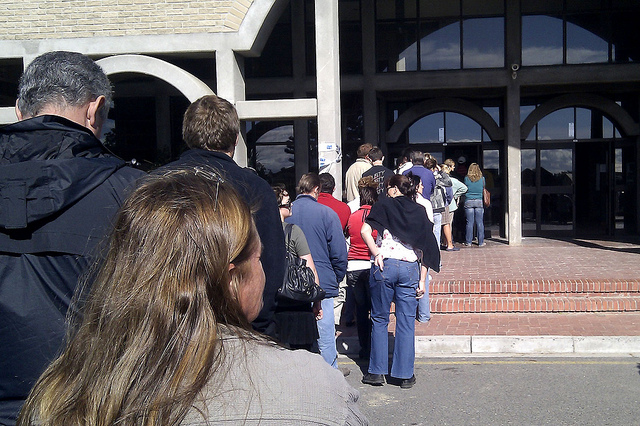Recent changes to electoral registration could see as many as 10 million people slip off the electoral register
Labour faces an enormous struggle to win another general election, with strategic issues combining with the Government’s changes to electoral registration leaving them in a very tricky political situation. Paul Hunter, sharing research from a recent Smith Institute report by Jane Thomas, argues that it is difficult to believe that the government hasn’t played fast and loose with people’s democratic rights for the Conservatives’ political gain.

Credit: Warrenski, CC BY SA 2.0
According to Professor John Dunn, democracy is better seen as a journey than a destination. If that’s so, then British democracy in recent months has taken something of a wrong turn. But, rather than being the cause of navigational ineptitude or a faulty sat-nav, the government’s rush to introduce individual voter registration suggests intention behind this particular detour.
As the Smith Institute report on individual voter registration, published on the eve of the switch, highlighted, as many as 10 million people are likely now to be missing from the electoral register. That figure is equivalent to 20% of the electorate and more than the votes the Labour party received at the general election.
There are good reasons why updating an ageing system was needed, not least to increase the accuracy of the electoral roll. And faith in the democratic process does rely on the system being free from voter fraud. However, it is also reliant on elections reflecting the views of the whole population. But rather than taking their time on such a sensitive and important issue the government has rushed ahead and ignored a weight of evidence.
Left by the wayside was the views of the independent Electoral Commission, which argued strongly that another year was needed to vastly improve the completeness of the register. Instead, hundreds of thousands of people in our major cities are now being disenfranchised – half a million in London and 100,000 in Glasgow, estimates suggest. The attitude in parliament towards such an impact demonstrates a laziness in understanding coupled with a cavalier approach to the democratic rights of citizens. For example, Eleanor Laing MP (the former shadow minister for justice) told the BBC that “if a young person cannot organize the filling in of a form that registers them to vote, they don’t deserve the right to vote”.
Whilst such comments should stick in a democrat’s craw, the impact of the change is even harder to swallow. Groups often overlooked by the government are most likely to slip off the register altogether – young people, students, ethnic minorities and those renting privately. All too conveniently for the government, such groups are less likely to vote them back in.
Furthermore, not only will this lead people being denied the opportunity to have a say over who governs them but it is also likely to skew the wider electoral system too. The upcoming boundary review of parliamentary seats will now be based on an even more incomplete electoral roll. As those who are excluded are more likely to be found in cities, there is likely to be disproportionately fewer MPs representing urban areas than the population should demand. Want to see who that will benefit? Just take a look at a map of the last election.
Such facts make it hard not to believe that the government has played fast and loose with people’s democratic rights for political gain. The challenge now is to shame government into upping its game to get more people registered. Failure to do so will make it hard to accept any future boundary review based on an electoral roll so tarnished. More seriously still, rather than improving the electoral system the disenfranchisement of millions will take us backwards on our democratic journey.
—
Click here to see the full report
This post represents the views of the author and not those of Democratic Audit UK or the LSE. Please read our comments policy before posting.
—
Paul Hunter is Head of Research at the Smith Institute, an independent think tank based in London.






 Democratic Audit's core funding is provided by the Joseph Rowntree Charitable Trust. Additional funding is provided by the London School of Economics.
Democratic Audit's core funding is provided by the Joseph Rowntree Charitable Trust. Additional funding is provided by the London School of Economics.
But under first past the post most of our views can’t be reflected. Outside the marginals our votes are worthless and even in the marginals we have to accept one of the parties’ nominees.
So can we use this to our benefit? Should there be a campaign to refuse to register in all “safe” seats (urban or rural), driving the “size” of the apparent electorates down and thereby making them more likely to be abolished and less likely to distort the election results?
Recent changes to electoral registration could see as many as 10 million people slip off the electoral register https://t.co/PsjJuVkd79 #IER
Recent changes to electoral registration could see as many as 10 million people slip off the electoral register https://t.co/cqBcWQ1h1b
Recent changes to electoral registration could see as many as 10 million people slip off the electoral register https://t.co/pP738XFg9I
Government playing fast and loose with people’s democratic rights – my piece for @democraticaudit https://t.co/ztKhOy5jEK
Electoral registration: The #Tories are ‘playing with people’s democratic rights for political gain’ | #Democracy https://t.co/qwsAWuzDi7
Recent changes to electoral registration could see as many as 10 million people slip off the electoral register https://t.co/cqBcWPJG9D
Recent changes to electoral registration could see as many as 10 million people slip off… https://t.co/TLc6MRgxoG https://t.co/wQaJ7RnGOP